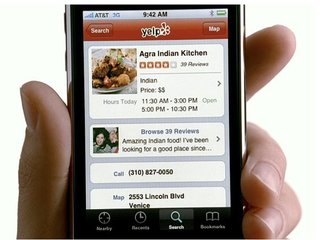

Yelp shares soared 23.47% to $51.61 Thursday morning after the company killed it in the second quarter.
Yelp revealed Wednesday afternoon that it saw a net loss of $0.01 per share on revenue of $55 million in the second quarter of 2013. That’s compared to a loss of $0.03 per share on revenue of $32.7 million in Q2 2012. And that’s a significant leap over analysts’ expectations of $53.3 million and a loss of $0.04 per share.
In the first six months of 2013, Yelp generated $101.2 million in revenue, an increase of 68% from the same period last year when it generated $60 million. Adjusted EBITDA for Q2 2013 was $7.8 million, compared to $1.6 million in Q2 2012.
“Yelp’s existing revenue playbook continues to show signs of operating expense leverage, and the addition of new transaction-oriented products/assets (Call-to-Action, Platform, SeatMe) may help drive advertiser adoption by highlighting the value of increased visibility on the Yelp platform (and could diversify Yelp’s business should any become meaningful revenue streams in their own right),” said Macquarie analyst Tom White in a research note.
But there’s a caveat: “As for risks, we still have some lingering questions about the pace of Yelp’s International monetization as well as the potential for eventual disintermediation by Google – both of which keep us on the sidelines for now.”
Google unveiled Google Carousel, its new search tool for local businesses, in June. For now, it looks like Google Carousel is limited to restaurants and bars, but will likely expand to other types of businesses in the future. When a user searches for something like “sushi restaurants in Mountain View,” a grid will appear at the top of the search results with a list of nearby restaurants, consumer reviews and ratings, and where those restaurants are on the map.
Yelp claims that it hasn’t seen any engagement impact from Google Carousel so far.
Yelp’s mobile strategy is going swimmingly. Some 40% of local ads were shown on mobile devices along with 59% of searches. Last quarter, 36% of local ads were shown on mobile devices and the mobile app was used on some 10 million unique mobile devices on a monthly basis. And in Q2, Yelp launched a number of mobile upgrades, including the Nearby feature, which suggests local businesses and activities based on location, behavior, friends’ activities, and other data.
Average unique monthly visitors grew 38% year-over-year to 108 million, up from 102 million last quarter.
Some other interesting tidbits: a recent study by Nielsen found that when customers find a local business on Yelp, 89% make a purchase within a week. Earlier this month, the company launched Yelp Platform to allow customers to transact with businesses directly on Yelp. It also launched the Call to Action feature that allows advertisers to promote a desired transaction directly on their Yelp business listing.
Additionally, Yelp launched in six new markets, including two domestically and four internationally.
And in July, Yelp acquired the restaurant and nightlife reservation solution SeatMe.
“We are very pleased with our performance this quarter, with revenue growth accelerating to 69% year over year,” said Yelp CFO Rob Krolik, in a statement. “This was driven by record results across all our key financial and operating metrics. We also saw considerable leverage in our business model with nearly a 400% increase in adjusted EBITDA as compared to last year.”
Yelp is setting revenue guidance at $58-$59 million for the third quarter, with adjusted EBITDA of $7.5-8 million. Full year revenue is expected to be in the range of $222-$224 million, which would be an increase of 62% over 2012. Full year EBITDA is expected to be $27-$28 million.
Image source: cloudfront.net

















